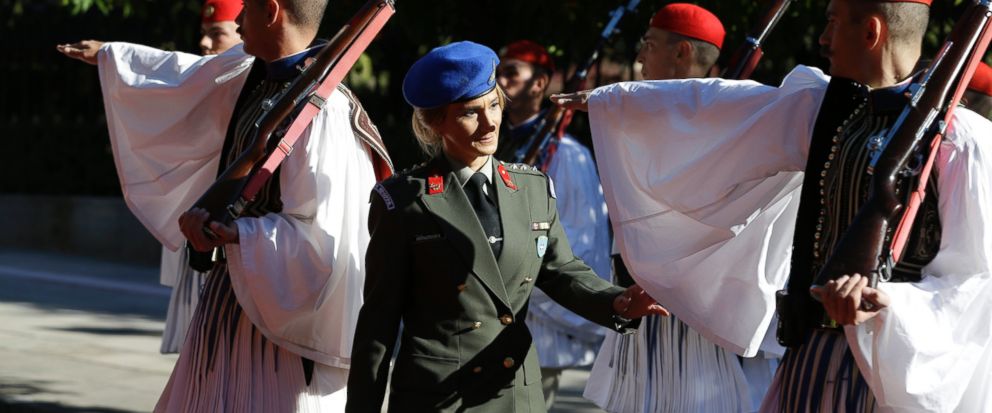Visit to Greece by Turkish president off to tense start
The first official visit by a Turkish president to Greece for six decades got off to a tense start Thursday, with Recep Tayyip Erdogan repeating comments that have alarmed his Greek hosts about the need to "update" the 1923 Treaty of Lausanne that delineated the borders of modern Turkey, among other issues.
Erdogan's first meeting was with Greek President Prokopis Pavlopoulos, and the televised discussions between the two men, usually reserved for formalities before closed-door talks, were visibly awkward.
The presidents engaged in a thinly-veiled verbal spat over the Muslim minority in northeastern Greece and the treaty. Erdogan's two-day visit to Greece will include a trip to northeastern Greece Friday to meet with the community, which Greece recognizes only as a religious minority. The status of the community, which Turkey considers to be a Turkish minority, was also determined by the Treaty of Lausanne.
On the eve of his arrival, Erdogan rattled Greek officials by saying in an interview with Greece's Skai television that the 1923 Treaty of Lausanne, which determined current Greek-Turkish borders among other issues, should be "updated."
"In fact, all agreements (pacts) in the world should be updated with the passage of time," Erdogan said in the interview. "Lausanne too, in the face of all these developments, is in need of an update. This update would be beneficial not only for Turkey but also for Greece."
Erdogan has made similar comments in the past about the peace treaty, which determined regional borders, but his repetition on the eve of his visit has perturbed his hosts.
His comments "raises serious concerns and questions," Greek government spokesman Dimitris Tzanakopoulos said in a statement. "The Greek government and the prime minister want his visit to be a reason to build bridges, not to raise walls."
Respecting the treaty is "the exclusive and non-negotiable foundation on which the honest cooperation of the two countries can be built," Tzanakopoulos said. "Comments regarding its revision do not contribute to the climate we are trying to build in our relations and in the region."
But Erdogan reiterated his views on the historic treaty during his meeting with Pavlopoulos.
"This happened in Lausanne, that happened in Lausanne. I get that, but let's now quickly do what is necessary," he told the Greek president. "It's not easy, 94 years have passed, and many things have changed in 94 years. If we review these, I believe that all the sides will agree that so many things have to (change.)"
For his part, Pavlopoulos told Erdogan the treaty "doesn't need revision or updating. It is valid as is." He added the treaty didn't allow space for territorial disputes and clearly set the status for the Muslim minority in Greece.
"It is clear that to achieve our goals and to make this visit a historic one … as Greece is a member of the EU … this requires the full respect of international law," Pavlopoulos said.
Erdogan's televised chat with Prime Minister Alexis Tsipras immediately afterward was calmer.
"There have always been differences between our countries and the positions of each country are well known," Tsipras told Erdogan. "What matters is that beyond those differences, we look for common ground and that the differences are addressed in a constructive way, with respect to the other's opinion and without provocations and exaggeration."
The refugee crisis will be high on the agenda, as Greek islands have been the gateway into Europe for migrants crossing from the Turkish coast. Regional relations, energy and business ties, Turkey's stalled bid to join the European Union and longstanding disputes such as Turkey's territorial claims in the Greek Aegean will also be discussed.
One of the current thorny issues likely to be raised will be the case of eight Turkish servicemen who have requested asylum in Greece following last year's failed coup in Turkey. Ankara has demanded their extradition, a request rejected by Greek courts on the grounds they could not be guaranteed a fair trial in Turkey.
The move infuriated Erdogan, who said in his Wednesday interview that his country's judicial system is "the best in Europe," adding the servicemen should have been handed over before Greek courts became involved.
"If you leave it up to the judiciary there will be no result," he said. "In order to facilitate the work of the judiciary you must first, as the government, take the necessary measures before you assign it to the judiciary."
Erdogan's visit comes as his country finds itself increasingly isolated on the international stage.
Turkey's ties with the EU and several European countries deteriorated significantly following Erdogan's post-coup crackdown. Tens of thousands of Turks have been fired from their jobs, and tens of thousands more have been imprisoned on accusations of being linked, however tenuously, with Fethullah Gulen, the U.S.-based Islamic cleric Erdogan blames for masterminding the coup.
Other than Greece, Poland is the only other EU country to have invited Erdogan to visit since mid-2016.
Historical tensions between Greece and Turkey, which have brought the two to the brink of war three times since the 1970s, remain. Decades-old thorny issues include territorial disputes in the Aegean, the Muslim minority and the continued occupation by Turkish troops of northern Cyprus.
————
Suzan Fraser in Ankara, Turkey, and Derek Gatopoulos in Athens contributed.
- Star
Add Interests Customize your news feed by choosing the topics that interest you.
To save your interests across all devices Log In or Sign Up »Source – abcnews.go.com

